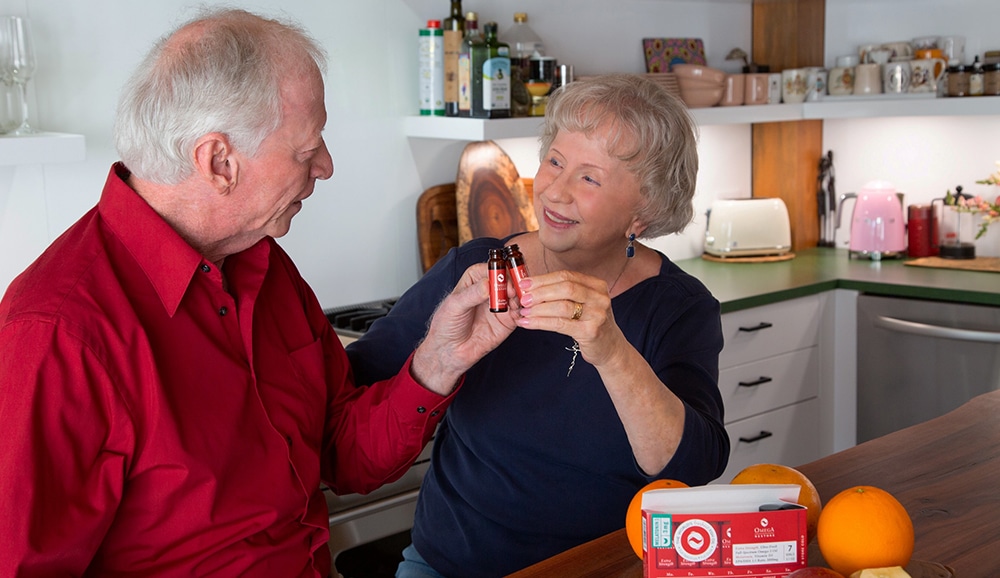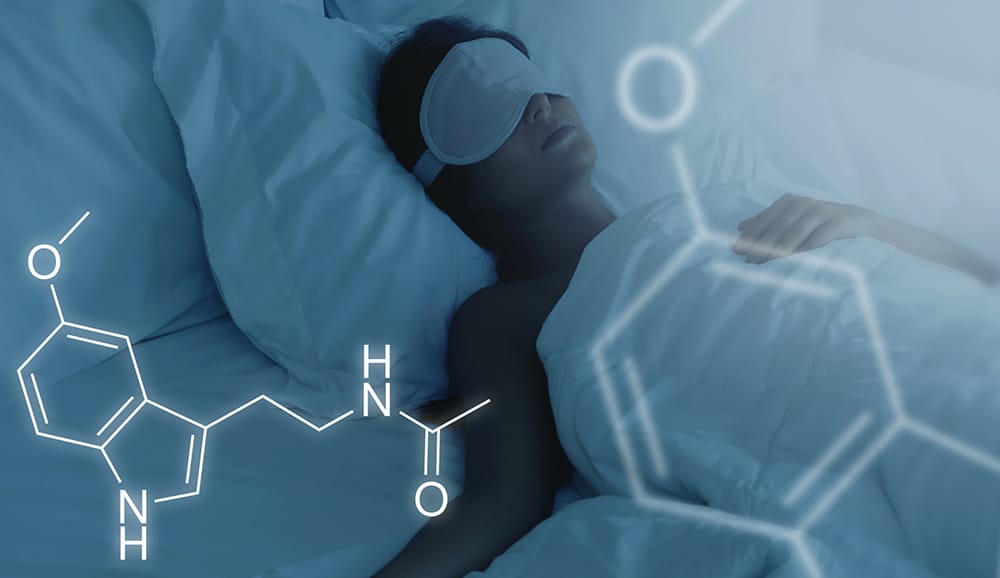The Relationship Between Melatonin and Testosterone
In recent years, melatonin supplements have become a go-to for people trying to sleep better and fix their sleep schedules. At the same time, there’s growing interest in understanding how melatonin impacts testosterone levels—a hormone essential for muscle mass, mood, and overall energy in both men and women.
Does Melatonin Lower Testosterone?
The short answer is no—melatonin does not appear to lower testosterone. While more research is needed, current studies show that melatonin likely has no negative effect on testosterone levels and may even be beneficial.
One recent study looked at data of 7,656 men who took part in the National Health and Nutrition Examination Survey (1). It found no link between taking regular doses of melatonin and having low testosterone (defined as levels below 300 ng/dL). In contrast, factors like age and higher BMI had an impact on reducing testosterone.
Why is there concern that melatonin could reduce testosterone levels? Animal studies may be creating some confusion. For instance, research on roosters found that melatonin inhibited testosterone production (2). However, scientists emphasize that melatonin’s effects on testosterone vary by species (3). This highlights an important point: when it comes to melatonin, results from certain animal studies don’t always translate directly to humans.
There aren’t many studies on how melatonin supplementation specifically affects testosterone in humans. However, the research so far indicates that for most people, taking a low to moderate dose of melatonin likely will not have a negative effect.
Understanding Testosterone Levels in Men and Women
Testosterone is often associated with male development and masculinity, but it’s actually a critical hormone in both men and women. As a sex hormone, testosterone plays several key roles across various bodily functions.
In men, testosterone regulates traits commonly associated with puberty, such as a deeper voice, muscle growth, and the development of facial and body hair. It also helps to maintain sex drive, muscle mass, fat distribution, and red blood cell production throughout adulthood (4).
Women, while having much lower levels of testosterone than men, also rely on it for bone density, muscle mass, mood regulation, sexual function, and overall energy (5). As people age, testosterone levels naturally decrease, which can lead to various physical and emotional changes.
Low testosterone affects nearly 40% of men over 45, leading to symptoms like reduced libido, fatigue, mood changes, and muscle loss.
Testosterone Levels in Men

Healthy testosterone levels for men generally range from 450 to 600 ng/dL, though definitions of “normal” can vary depending on individual health and lifestyle factors (6).
Symptoms of Low Testosterone in Men
Research shows that nearly 40% of men over the age of 45 experience low testosterone levels, often without recognizing it (7). Low testosterone production in men, also called hypogonadism, can cause a variety of symptoms (3).
Some of the most common include:
- Reduced sexual desire and fewer spontaneous erections
- Erectile dysfunction
- Decreased muscle mass and strength
- Fatigue and low energy
- Mood changes, such as depression or irritability
- Reduced bone density, increasing the risk of fractures
- Cognitive issues, such as difficulty concentrating
Testosterone Levels in Women

In women, testosterone is produced primarily in the ovaries, and levels are much lower compared to men. Before menopause, women produce about three times more testosterone than estrogen, though levels naturally decrease with age, particularly after menopause.
For women, a healthy testosterone level ranges from 10 to 55 ng/dL before menopause and slightly lower afterward, from 7 to 40 ng/dL (6). Though lower testosterone is often associated with aging in women, other factors—such as certain medications or health conditions—can also impact testosterone levels.
Symptoms of Low Testosterone in Women
Low testosterone in women may lead to a variety of health challenges, including:
- Fatigue and low energy levels
- Decreased libido and sexual satisfaction
- Mood changes, such as irritability or depression
- Reduced muscle mass and bone density, increasing the risk of osteoporosis
- Difficulty with concentration and memory
Melatonin helps regulate the body’s internal clock, signaling when to sleep and wake.
What Does Melatonin Do?

The body’s natural sleep rhythm can be disrupted by factors such as aging, light pollution, shift work, travel or irregular sleep schedules. That’s why melatonin supplements have become a popular option for addressing sleep issues, like jet lag.
Melatonin and Sleep
Melatonin supplements can be particularly effective for certain sleep disorders (8). For those with delayed sleep-wake phase disorder, a condition where sleep is naturally delayed by two hours or more, melatonin can help shift sleep patterns to an earlier time.
Studies also show melatonin can improve symptoms of jet lag, especially for travelers crossing multiple time zones, and may help individuals with circadian rhythm disorders, such as shift workers, adjust to non-traditional hours.
While melatonin supplementation does not universally improve sleep quality for everyone, it can be beneficial for those who naturally produce less melatonin and for individuals with certain sleep conditions.
The Relationship Between Melatonin and Testosterone
Melatonin is widely known as a sleep regulator, but its role in the body goes far beyond promoting rest. This powerful molecule functions as a potent antioxidant and anti-inflammatory agent. It also plays a key role in cell signaling and interacting with cell membrane receptors.
Because of its diverse functions, melatonin is linked to many benefits, from brain health to supporting the immune system. Melatonin also influences fertility, which is why its connection to testosterone is getting more attention. Emerging research suggests that melatonin may indirectly affect testosterone levels in a few different ways.
Modulating Leydig Cells
The Leydig cells are where testosterone is synthesized in the testes. Cell studies show that melatonin modulates the activities of the Leydig cells, thereby influencing testosterone production (3).
As a powerful antioxidant, melatonin also may protect the Leydig cells from oxidative stress caused by environmental toxins or inflammation. Indeed, a number of studies have explored this protective effect, finding that higher melatonin levels correlate with increased testosterone production, improved sperm quality, and reduced damage to Leydig cells (9, 10).
Improving Sleep Quality
Research indicates that sleep deprivation can drastically reduce testosterone levels in otherwise healthy young men (11). In a study where men were restricted to less than five hours of sleep per night, testosterone levels dropped by 10-15% within just one week, levels usually seen only after aging 10 to 15 years.
By promoting better sleep quality, melatonin may contribute to a well-balanced hormonal environment, which is essential for maintaining healthy testosterone levels. Good sleep helps the natural production of luteinizing hormone (LH), which signals the body to produce testosterone in the Leydig cells.
Recommendations for Melatonin Intake

Melatonin supplementation is widely used to aid sleep and support circadian rhythm balance. Studies suggest effective doses for adults typically range from 0.1 mg to 10 mg (12).
When aiming for improved sleep, taking a daily dose between 30 minutes to two hours before bedtime may be sufficient. Although melatonin has a strong safety record, higher doses aren’t generally recommended without medical supervision.
For children, it’s best to consult with a medical doctor.
While melatonin is available over the counter and considered safe for most people, it’s essential to select high-quality supplements. Omega Restore is a unique supplement that combines the benefits of omega-3 fish oil with melatonin and vitamin D3. Each dose of Omega Restore includes 3000 mg of EPA/DHA, 1400 IUs of vitamin D3, and melatonin, providing a powerful synergy for sleep, energy, immune support, and protection against free radical damage.
Should You Take Melatonin Supplements to Increase Testosterone?
Does melatonin lower testosterone? No, and it might even help support testosterone levels indirectly. Since testosterone production depends on getting enough good-quality sleep, using melatonin to improve sleep can be helpful, especially for people with irregular sleep patterns.
Low-dose melatonin supplementation, especially when combined with other nutrients like omega-3s and vitamin D3, can be a holistic way to support well-being. Supplements like Omega Restore offer a thoughtfully balanced formula for adults looking to improve their sleep quality and promote a more balanced lifestyle.
- Zizzo J, Reddy R, Kulkarni N, Blachman-Braun R, Ramasamy R. Impact of Low-Dose Melatonin Supplementation on Testosterone Levels in U.S. Adult Males. Urology. 2022;169:92-95. doi:10.1016/j.urology.2022.07.048
- Xu H, Pu J, Teng Y, et al. Melatonin Inhibits Testosterone Synthesis in Rooster Leydig Cells by Targeting CXCL14 through miR-7481-3p. International Journal of Molecular Science. 2023; 24(23):16552. doi:10.3390/ijms242316552
- Yu K, Deng SL, Sun TC, Li YY, Liu YX. Melatonin Regulates the Synthesis of Steroid Hormones on Male Reproduction: A Review. Molecules. 2018; 23(2):447. doi:10.3390/molecules23020447
- Wein H. Understanding How Testosterone Affects Men. National Institutes of Health (NIH). Published September 23, 2013. https://www.nih.gov/news-events/nih-research-matters/understanding-how-testosterone-affects-men
- Glaser R & Dimitrakakis C. Testosterone Therapy in Women: Myths and Misconceptions. Maturitas. 2013; 74(3): 230 – 234. doi: 10.1016/j.maturitas.2013.01.003
- Severson A. Testosterone Levels by Age. Healthline. Published November 7, 2018. https://www.healthline.com/health/low-testosterone/testosterone-levels-by-age
- Mulligan T, Frick MF, Zuraw QC, Stemhagen A, McWhirter C. Prevalence of Hypogonadism in Males Aged at least 45 years: the HIM study. International Journal of Clinical Practice. 2006; 60(7):762-769. doi:10.1111/j.1742-1241.2006.00992.x
- Mayo Clinic Staff. Melatonin. Mayo Clinic. Published March 3, 2021. https://www.mayoclinic.org/drugs-supplements-melatonin/art-20363071
- Yang M, Guan S, Tao J, et al. Melatonin Promotes Male Reproductive Performance and Increases Testosterone Synthesis in Mammalian Leydig Cells†. Biology of Reproduction. 2021; 104(6):1322-1336. doi:10.1093/biolre/ioab046
- Li C, Zhou X. Melatonin and Male Reproduction. Clinica Chimica Acta. 2015; 446:175-180. doi:10.1016/j.cca.2015.04.029
- Sleep Loss Lowers Testosterone in Healthy Young Men. University of Chicago Medicine. Published May 30, 2011. https://www.uchicagomedicine.org/forefront/news/sleep-loss-lowers-testosterone-in-healthy-young-men
- Savage RA, Zafar N, Yohannan S, et al. Melatonin. [Updated 2024 Feb 9]. In: StatPearls [Internet]. Treasure Island (FL): StatPearls Publishing; 2024 Jan-. Available from: https://www.ncbi.nlm.nih.gov/books/NBK534823/
Popular posts



Related posts






